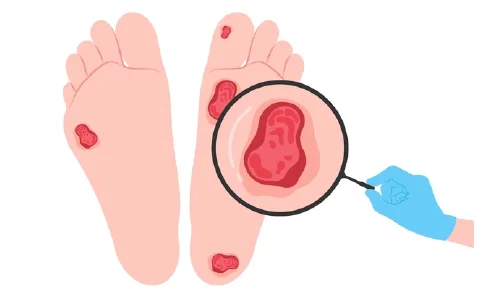Diabetic foot ulcers are open sores or wounds that occur in individuals with diabetes, typically on the bottom of the foot. These ulcers can lead to serious complications, including infections and even amputation. The key lies in prompt diagnosis. If not treated promptly, the complications can turn fatal. For expert care and advanced treatment options, consult the top specialists at the CK Birla Hospital in Gurgaon.
Diabetic foot ulcers develop due to a combination of factors such as poor circulation, high blood sugar levels, and nerve damage (neuropathy). These reduce the ability to feel pain and detect injuries over time. These ulcers are usually slow to heal and require specialised care to prevent complications.

| Aspect | Minimally Invasive Surgery | Traditional Open Surgery |
| Incisions | Smaller incisions | Larger incisions |
| Recovery Time | Shorter recovery period | Longer recovery period |
| Pain and Scarring | Less pain and minimal scarring | More pain and noticeable scarring |
| Hospital Stay | Shorter hospital stay | Longer hospital stay |
| Infection Risk | Reduced risk of infection | Higher risk of infection |
Healing time varies depending on the severity of the ulcer and the patient’s overall health. Generally, minor ulcers may heal within a few weeks, while more severe ulcers can take several months to fully heal.
Yes, diabetic foot ulcers can often be prevented with proper foot care, regular inspections, wearing appropriate footwear, maintaining good blood sugar control, and regular check-ups with a healthcare provider.
If you notice a sore on your foot, clean it with mild soap and water, apply a sterile dressing, and contact your healthcare provider immediately for further evaluation and treatment.
Most health insurance plans cover the treatment of diabetic foot ulcers, including doctor visits, medications, wound care supplies, and necessary procedures. It is advisable to check with your insurance provider for specific coverage details.
Walking with a diabetic foot ulcer should be minimised to prevent further damage. Use offloading devices or special footwear as recommended by your healthcare provider to reduce pressure on the ulcer and promote healing.
Signs of an infected foot ulcer include increased pain, redness, swelling, warmth around the wound, foul-smelling discharge, and fever. Seek medical attention promptly if you notice any of these symptoms.
For expert diagnosis and treatment of diabetic foot ulcers in Gurgaon, trust the experienced specialists at the CK Birla Hospital. Contact us to schedule a consultation and explore your treatment options.